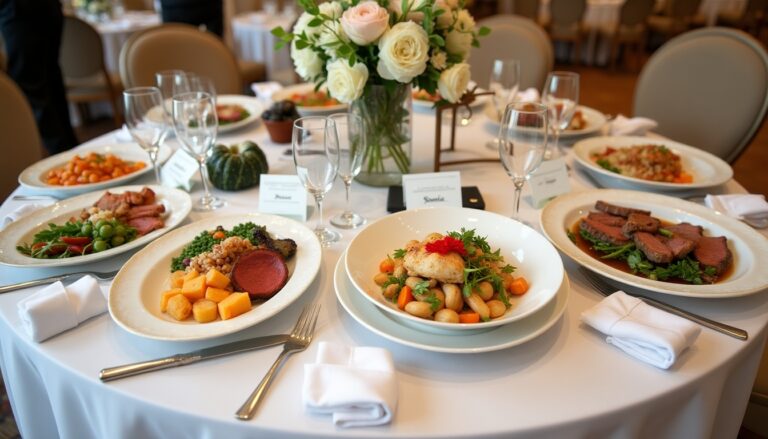Planning a wedding menu that accommodates different dietary needs doesn’t have to be overwhelming.
With careful planning and creativity, you can create a menu that delights all your guests while respecting their dietary restrictions.
This guide walks you through the essential steps of planning an inclusive wedding menu that caters to various dietary requirements without compromising on taste or presentation.
Common Dietary Restrictions to Consider
- Vegetarian
- Vegan
- Gluten-free
- Dairy-free
- Nut allergies
- Kosher
- Halal
Menu Planning Steps
- Include dietary questions in your RSVP cards
- Consult with your caterer early in the planning process
- Plan for at least one option per dietary restriction
- Consider a buffet-style service for more flexibility
- Label all dishes clearly at the reception
Smart Menu Solutions
Appetizers: Offer fresh vegetables with both dairy-based and vegan dips.
Main Course: Consider grilled proteins with separate sauces served on the side.
Side Dishes: Choose naturally gluten-free options like roasted vegetables and rice.
Desserts: Include both traditional wedding cake and alternative options like fruit platters or dairy-free sorbet.
Working with Your Caterer
- Schedule a tasting session for alternative menu items
- Request detailed ingredient lists for all dishes
- Discuss cross-contamination prevention methods
- Plan for separate preparation areas for allergy-sensitive foods
Cost-Effective Tips
Choose dishes that naturally meet multiple dietary requirements to minimize additional costs.
Consider plant-based options that appeal to both vegetarians and meat-eaters.
Work with seasonal ingredients to keep costs manageable while ensuring quality.
Sample Menu Ideas
| Dietary Need | Appetizer | Main Course |
|---|---|---|
| Vegetarian | Bruschetta | Grilled Portobello Steak |
| Gluten-Free | Rice Paper Rolls | Herb-Crusted Chicken |
| Vegan | Hummus Platter | Quinoa-Stuffed Bell Peppers |
Final Tips for Success
Train serving staff on identifying different dietary options and handling allergy concerns.
Create clear signage for buffet items with dietary information.
Have a system in place to identify guests with specific dietary needs discretely.
Keep detailed records of special meal requests and share them with all relevant vendors.
Additional Menu Considerations
Consider incorporating international cuisine options that naturally accommodate different dietary restrictions.
Plan for adequate portions of special dietary meals to ensure you don’t run short.
Beverage Selection
- Include non-alcoholic options
- Offer dairy-free milk alternatives for coffee service
- Consider gluten-free beer options
- Label drinks containing common allergens
Communication Strategies
Clear communication is essential for successful dietary accommodation:
- Include dietary information on your wedding website
- Create place cards with discrete dietary indicators
- Brief wedding coordinators about special meal arrangements
- Prepare staff to answer ingredient questions
Emergency Preparations
- Have backup meal options available
- Keep detailed ingredient lists on hand
- Know the location of nearest medical facilities
- Consider having allergy medications available
Creating Your Perfect Inclusive Celebration
A thoughtfully planned wedding menu shows care and consideration for all your guests. By implementing these strategies, you’ll create an inclusive dining experience that allows everyone to fully participate in your celebration.
Remember that accommodating dietary restrictions isn’t just about providing alternative options – it’s about making every guest feel valued and considered on your special day.
With proper planning and attention to detail, your wedding menu can be a highlight of your celebration, bringing together all your loved ones in a shared dining experience regardless of their dietary needs.
FAQs
- How early should I start planning the wedding menu to accommodate dietary restrictions?
Start planning 6-8 months before the wedding to allow time for menu testing, vendor coordination, and guest dietary information collection. - What are the most common dietary restrictions I need to consider for wedding menus?
The most common restrictions include vegetarian, vegan, gluten-free, dairy-free, nut allergies, kosher, halal, and seafood allergies. - Should I include dietary restriction options on the wedding invitations?
Yes, include a section on your RSVP cards for guests to indicate their dietary restrictions, allergies, or preferences. - How can I label food items at the reception to identify different dietary options?
Use clear, visible cards or markers with symbols or text indicating vegan, vegetarian, gluten-free, contains nuts, etc., for each dish. - What’s the best way to serve guests with different dietary needs at a buffet-style reception?
Organize separate stations for different dietary needs, clearly label all items, and have staff available to answer questions about ingredients. - How many alternative meal options should I provide?
Offer at least 2-3 alternative options, including one vegetarian/vegan choice and one gluten-free option that can accommodate multiple restrictions. - Should I inform my caterer about guest allergies in advance?
Yes, provide your caterer with a detailed list of all dietary restrictions and allergies at least 2-3 weeks before the wedding to ensure proper preparation. - How can I manage the cost while accommodating multiple dietary restrictions?
Choose dishes that naturally meet multiple dietary requirements, opt for seasonal ingredients, and discuss cost-effective alternatives with your caterer. - What are some safe appetizer options that work for most dietary restrictions?
Fresh fruit, vegetable crudités, gluten-free crackers with hummus, and rice-based appetizers are generally safe choices for most restrictions. - Should I have separate preparation areas for different dietary needs?
Yes, especially for severe allergies, kosher requirements, or cross-contamination concerns, request that your caterer use separate preparation areas and utensils.






